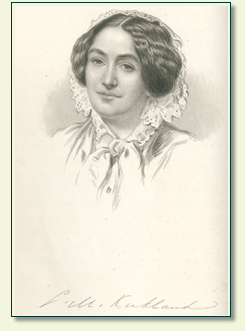|

John S. Hart, ed. Female
Prose Writers of America (1852), plate opposite p. 105.
|
CAROLINE
M. KIRKLAND (1801 – 1864)
A childhood in New
York City provided Caroline Kirkland with an urban
counterpoint for her later experiences on the western frontier, and she
showcased her qualities of East Coast wit and western tenacity in her
narrative accounts of her life as a frontierswoman. Educated at her aunt's
girls' schools in Mamaroneck and Manhattan,
she studied literature and languages and helped to run the school until her
marriage to classics scholar William Kirkland in 1828.
After administering a seminary for young ladies in Geneva, N.Y., for four
years, Caroline and William Kirkland moved with their children to Michigan, where
William had purchased 1300 acres of land on which he was determined to build
a town. For his wife, life in Michigan
was dreary; in addition to the physical drudgery of frontier life, she grew
bored and lonely, and began to recount the anecdotes and gossip of daily life
in long, funny letters to her friends to amuse herself. She stitched these
correspondences into a series of novels, and her books earned her commercial
success as well as the animosity of her neighbors who recognized themselves
in her satire.
Eventually returning
to New York
after years of economic hardship, Caroline Kirkland ran a girls' school in
her home and continued to publish stories about the West, assuming full
financial responsibility for her family after her husband died in 1846. A
highly energetic fixture in New
York literary circles, she organized writers to
raise money for medical supplies during the Civil War and contributed her
time and writing to social reform.
In 1846,
Edgar Allan Poe described her in his “The Literati of New York City.
No. IV,” in Godey’s
Lady’s Book v. 33 , p. 76:
She is rather above the medium height; eyes and hair dark;
features somewhat small, with no marked characteristics, but the whole
countenance beams with benevolence and intellect.
Another portrait appears in:
Evert A. and George L. Duyckinck, eds. Cyclopaedia of American Literature
(1855), vol. 2, p. 563.
NEXT>
|


